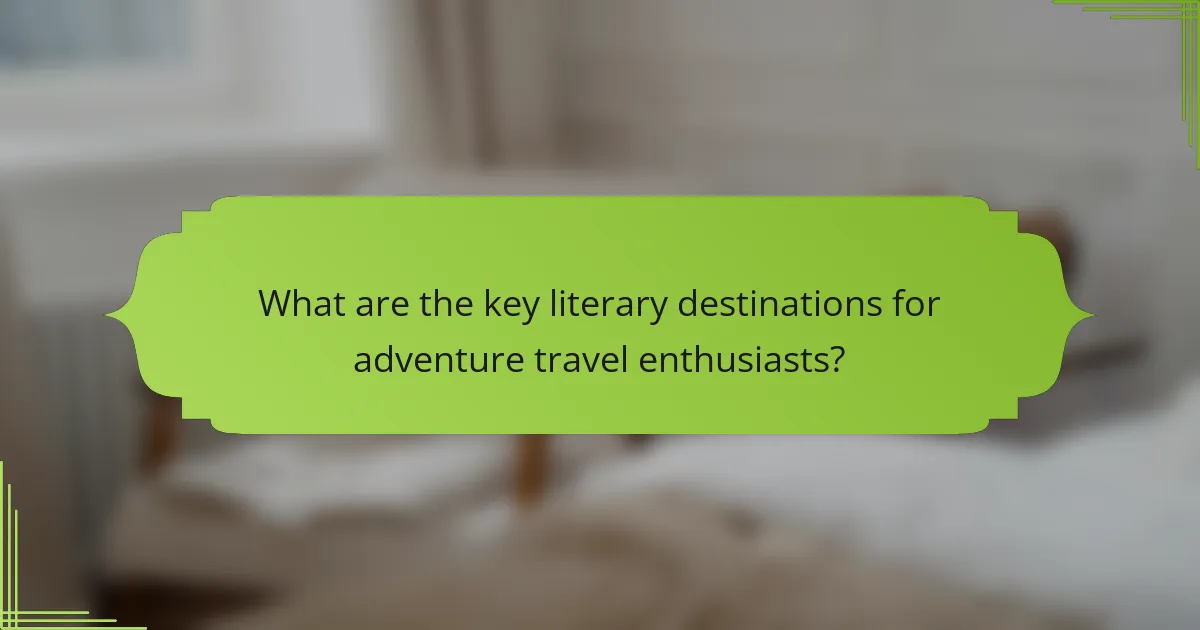Literary journeys immerse travelers in the worlds of classic literature, connecting them with iconic locations and authors. Explore key destinations like the Brontë Parsonage and Hemingway’s Home. Engage in guided tours, literary festivals, and workshops that deepen appreciation for beloved works. Navigate challenges while discovering the cultural contexts that inspired timeless narratives.

What are the key literary destinations for adventure travel enthusiasts?
Key literary destinations for adventure travel enthusiasts include the Brontë Parsonage Museum in England, the Hemingway Home and Museum in Key West, and the Mark Twain House in Hartford. Each site offers a unique glimpse into the lives of iconic authors. The Brontë Parsonage showcases the sisters’ writings and their Yorkshire landscape. The Hemingway Home immerses visitors in the author’s tropical surroundings. The Mark Twain House reflects the humour and social commentary of its namesake. These locations provide rich experiences for fans of literary classics.
Which classic novels inspire travel itineraries?
Classic novels that inspire travel itineraries include “The Great Gatsby,” “Pride and Prejudice,” and “Moby-Dick.” These works evoke specific locations and cultures, enhancing the travel experience.
“The Great Gatsby” invites visitors to explore the opulence of 1920s New York, particularly West Egg and East Egg. “Pride and Prejudice” offers a glimpse into the English countryside, with locations like Bath and Derbyshire reflecting the novel’s charm. “Moby-Dick” leads travelers to New Bedford, Massachusetts, where the whaling industry flourished.
Each of these novels provides a unique backdrop that enriches literary-themed journeys. Exploring these settings deepens appreciation for the stories and their authors.
How do literary festivals enhance travel experiences?
Literary festivals enhance travel experiences by immersing attendees in the worlds of their favourite authors. These events offer unique opportunities for interaction, exploration, and cultural enrichment.
Travelers can visit iconic literary locations, participate in workshops, and attend readings that bring literature to life. Festivals often feature local cuisine, art, and music, creating a holistic cultural experience.
Additionally, literary festivals foster connections among like-minded individuals, enriching social experiences and expanding networks. Engaging discussions and author signings provide personal insights that deepen appreciation for literary works.
Overall, literary festivals transform travel into a journey of discovery, creativity, and community engagement.

What unique experiences do literary journeys offer?
Literary journeys offer immersive experiences that connect fans with the settings and themes of their favourite classics. These adventures often include guided tours of iconic locations, literary festivals, and workshops led by authors. Participants gain unique insights into the lives of writers and the historical contexts of their works. Engaging with local cultures deepens appreciation for the literature, making the journey transformative and enriching.
How can travelers immerse themselves in the settings of their favourite books?
Travelers can immerse themselves in literary settings by visiting locations that inspired their favourite books. They can explore real-life landscapes, attend literary festivals, or participate in themed tours.
Many classic novels have specific geographical ties, enhancing the experience. For instance, fans of “Pride and Prejudice” can visit the English countryside, while “The Great Gatsby” enthusiasts can explore Long Island.
Travelers can also join book clubs or guided tours that focus on literary themes. Engaging with local guides can provide deeper insights into the narratives and characters associated with these places.
Additionally, staying in accommodations that reflect literary themes, such as historic inns or author-themed hotels, can further enrich the experience. These unique attributes create memorable connections between readers and the stories they cherish.
Which authors’ homes can be visited for a deeper connection?
Several authors’ homes can be visited for a deeper connection, including the homes of Ernest Hemingway, Mark Twain, and Jane Austen. These locations offer insights into their lives and inspirations.
1. Ernest Hemingway Home and Museum, Key West, Florida: Explore the house where Hemingway wrote some of his famous works.
2. Mark Twain House, Hartford, Connecticut: Visit the residence where Twain penned classics like “The Adventures of Tom Sawyer.”
3. Jane Austen’s House Museum, Chawton, England: Discover the cottage where Austen wrote and revised her beloved novels.
4. Charles Dickens Museum, London, England: Experience the home of Dickens, filled with personal artifacts and insights into his life.
5. The Brontë Parsonage Museum, Haworth, England: Learn about the Brontë sisters and the environment that inspired their literary masterpieces.
6. Virginia Woolf’s Monk’s House, Sussex, England: Visit Woolf’s country retreat, reflecting her life and literary contributions.

How does adventure travel cater to literary fans across different regions?
Adventure travel engages literary fans by providing immersive experiences tied to classic literature. These journeys often include visits to iconic locations, guided tours based on literary themes, and opportunities to explore the landscapes that inspired famous works.
Regions like the English countryside evoke the charm of Jane Austen’s novels, while the streets of Paris resonate with the words of Hemingway. Fans can participate in themed festivals, book readings, and workshops that deepen their connection to the literature.
Unique attributes of these adventures include curated itineraries that highlight lesser-known literary sites, enhancing the overall experience. Rare opportunities, such as private tours of authors’ homes, offer exclusive insights into their lives and inspirations.
As a result, literary-themed adventure travel fosters a deeper appreciation of classic literature while allowing fans to explore the cultural context behind their favourite works.
What are the most popular literary-themed tours in North America?
Some of the most popular literary-themed tours in North America include the Mark Twain House & Museum in Hartford, Connecticut, the Ernest Hemingway Home and Museum in Key West, Florida, and the Louisa May Alcott Orchard House in Concord, Massachusetts. These tours immerse visitors in the lives and works of renowned authors, offering unique insights into their literary contributions. Additionally, the Faulkner House in New Orleans, Louisiana, and the Jack London State Historic Park in California provide enriching experiences for literary enthusiasts. Each location showcases the authors’ unique attributes and their influences on American literature.
Which European cities are must-visit for literary enthusiasts?
Several European cities are essential for literary enthusiasts. Notable destinations include:
1. London, England – Home to iconic authors like Charles Dickens and Virginia Woolf, with landmarks such as the British Library.
2. Paris, France – Celebrated for its literary cafés and the legacy of writers like Ernest Hemingway and James Joyce.
3. Dublin, Ireland – Known for its rich literary history, featuring James Joyce and W.B. Yeats, and the Dublin Literary Pub Crawl.
4. Barcelona, Spain – Famous for its modernist literature and the works of Carlos Ruiz Zafón.
5. Edinburgh, Scotland – Recognized for its connections to Sir Arthur Conan Doyle and J.K. Rowling, with the Edinburgh Book Festival.
6. Prague, Czech Republic – A city that inspired Franz Kafka and has a vibrant literary scene.
These cities offer unique experiences for fans of literary classics.

What challenges do literary travelers face?
Literary travelers face challenges such as navigating unfamiliar locations, managing time constraints, and accessing literary sites. These hurdles can detract from the immersive experience of connecting with beloved literary classics. Additionally, some travelers may encounter language barriers or cultural differences that complicate their journey. Lastly, the emotional weight of visiting sites tied to authors’ lives can be overwhelming, affecting overall enjoyment.
How can travelers navigate accessibility issues in literary locations?
Travelers can navigate accessibility issues in literary locations by planning ahead and utilizing available resources. Researching accessibility features of sites ensures informed choices. Many literary landmarks offer virtual tours, which provide an alternative for those unable to visit in person. Additionally, contacting venues directly can provide specific information about accommodations. Engaging with local disability advocacy groups may yield insights on accessible routes and services.
What are the common misconceptions about literary travel?
Common misconceptions about literary travel include the belief that it is limited to visiting authors’ homes or that it only appeals to a niche audience. Many think literary journeys lack adventure, but they often involve exploring diverse landscapes depicted in classic works. Some assume literary travel requires extensive knowledge of literature, yet it can be enjoyed by anyone with a curiosity for stories. Additionally, there’s a notion that literary destinations are static; in reality, they often evolve, reflecting contemporary interpretations of classic literature.

What are the benefits of combining literature and adventure travel?
Combining literature and adventure travel enriches experiences, fosters creativity, and deepens connections to stories. Literary journeys allow travelers to explore settings that inspired classic works, enhancing appreciation for both the literature and the landscapes. Engaging with local cultures and histories creates a unique context for understanding narratives. Additionally, these adventures often encourage personal reflection, leading to transformative insights and inspiration.
How does literary travel enhance cultural understanding?
Literary travel enhances cultural understanding by immersing fans in the settings and contexts of literary classics. This exploration fosters deeper connections with diverse cultures through firsthand experiences and local narratives. Engaging with the landscapes, traditions, and histories depicted in literature allows travelers to appreciate cultural nuances. For example, visiting the English countryside as described in classic novels reveals the region’s historical significance and influences on the authors. Such journeys promote empathy and broaden perspectives, enriching the overall travel experience.
What role does storytelling play in travel experiences?
Storytelling enriches travel experiences by creating emotional connections to literary landscapes. It transforms destinations into immersive narratives, allowing travelers to engage with the essence of literary classics. Through storytelling, travelers can explore the historical and cultural contexts of their favourite books, enhancing their appreciation for the settings and characters. This connection deepens the journey, making it more memorable and meaningful. Additionally, literary-themed travel often includes guided tours, discussions, and activities that bring stories to life, fostering a unique adventure that resonates with fans of literature.

What are some rare literary experiences worth seeking out?
Literary journeys offer unique experiences that immerse travelers in the worlds of classic literature. Seek out destinations like the Brontë Parsonage in Yorkshire, where the Brontë sisters penned their novels. Explore the streets of Dublin, rich with James Joyce’s influence, especially during Bloomsday celebrations. Visit the American South to experience the settings of Mark Twain’s works, such as Hannibal, Missouri. Attend literary festivals like the Hay Festival in Wales, featuring discussions and readings from renowned authors. Discover the homes of famous writers, such as Ernest Hemingway’s house in Key West, which provides insights into his life and work.
Which hidden literary gems are often overlooked?
Many hidden literary gems are often overlooked, including works by lesser-known authors and unique narratives. Notable examples include “The Master and Margarita” by Mikhail Bulgakov, which blends fantasy and political satire, and “The Waves” by Virginia Woolf, showcasing her innovative stream-of-consciousness style. “The Book of Disquiet” by Fernando Pessoa offers deep introspection through fragmented thoughts. These works provide rich literary experiences for adventurous readers seeking to explore beyond mainstream classics.
How can travelers discover unique literary events?
Travelers can discover unique literary events through dedicated literary festivals, author readings, and themed tours. Engaging with local bookstores and literary societies also enhances the experience. Notable literary festivals, such as the Edinburgh International Book Festival, attract global audiences and showcase diverse literary voices. Additionally, exploring locations tied to classic literature, like the Brontë Parsonage Museum, offers immersive insights into authors’ lives. Participating in book clubs or literary workshops can further connect travelers with like-minded individuals and deepen their appreciation for literary classics.
What are the best practices for planning a literary journey?
To plan a literary journey effectively, focus on selecting destinations linked to your favourite authors and books. Research locations that inspired literary works and consider guided tours that enhance the experience.
Engage with local literary communities to gain insights and recommendations. Utilize itineraries that include visits to libraries, bookstores, and literary festivals.
Prioritise accommodations that reflect the literary theme, such as historic inns or author-themed hotels. Lastly, create a flexible schedule to allow spontaneous exploration of literary landmarks.
What common mistakes should travelers avoid when exploring literary destinations?
Travelers should avoid rushing, neglecting research, ignoring local customs, and failing to engage with the literature. These mistakes can diminish the experience of exploring literary destinations.
Rushing through visits leads to missed details and connections to the literature. Neglecting research can result in unplanned detours or overlooking significant sites. Ignoring local customs may offend residents and detract from the journey. Lastly, failing to engage with the literature limits the understanding of the destinations’ significance.